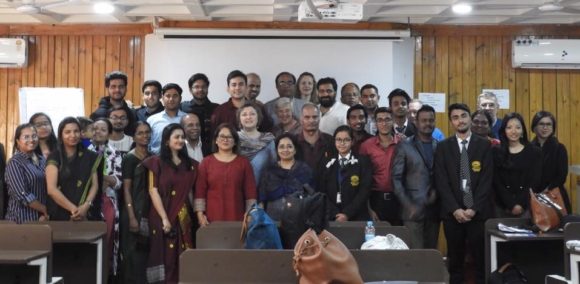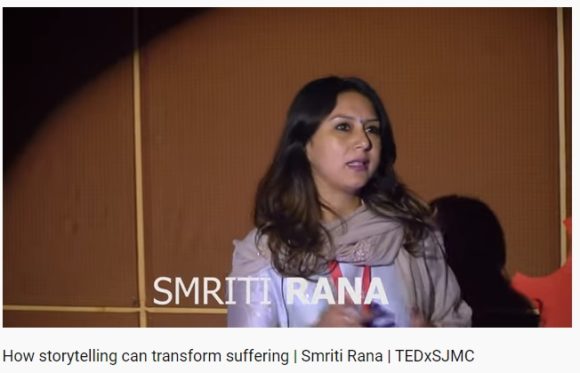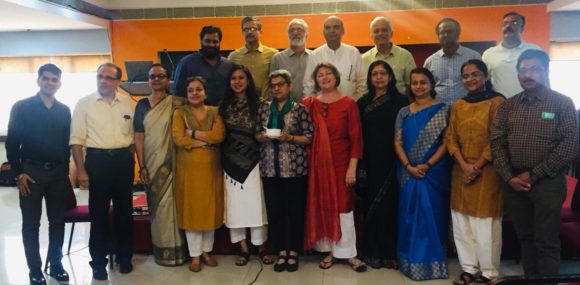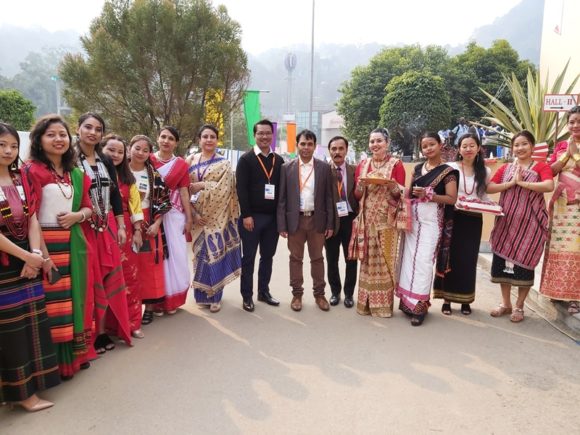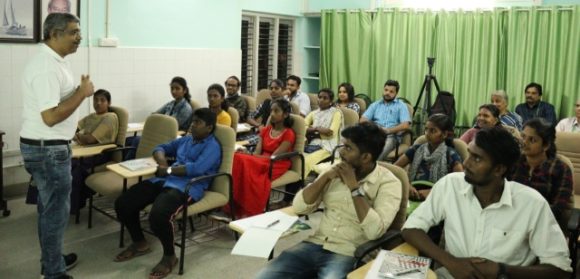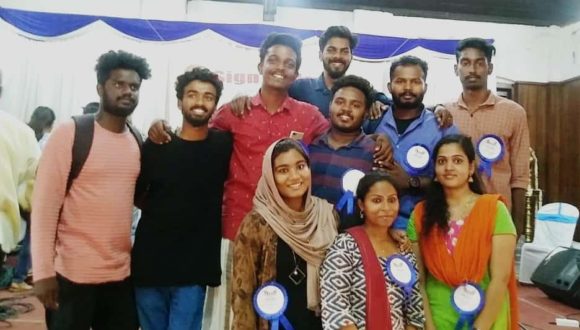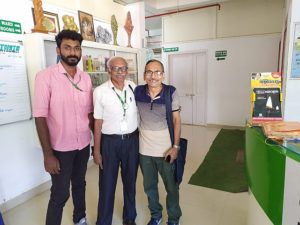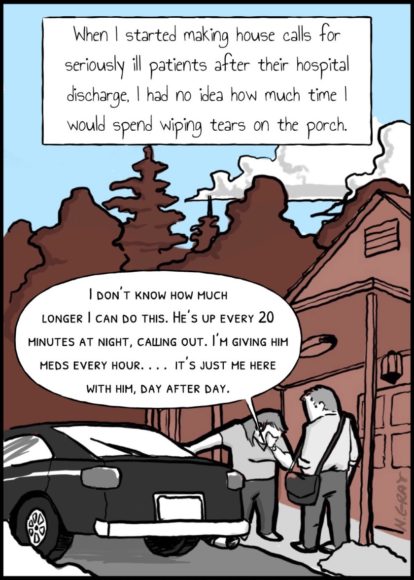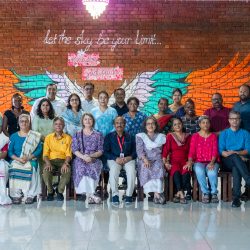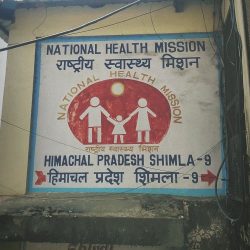March 2020
“Humanity to infinity”
A phrase we were introduced to by Mhoira Leng who had come across it in her work in conflict riddled Gaza, from those who suffer in ways most of us cannot even fathom – showing us that humanity and love have always been and always will be the only answer to unspeakable tragedy.
At the annual international palliative care conference this year, we saw the planting of a new seed – the first steps in creating a Task Force for palliative care in humanitarian aid and emergency settings in the Indian context.
Illness can bring unimaginable suffering. There is indescribable horror when there is a disaster, be it natural or manmade. Bring those two together and it is almost too much to bear. But rather than look away, it is now more than ever that we really need to examine the human condition in all its raging, despairing, clawing misery, and meet it with compassion.
The relief efforts in the aftermath of the massive earthquake in Nepal, the stories from Sudan and Gaza, and other accounts from Kerala were profoundly moving. Learning about the work done by the Border Security Force every year in Assam when the Brahmaputra river floods was an eye-opening experience.
And witnessing palliative care providers and defence personnel come together to talk about joining hands for the alleviation of suffering was unexpected, uplifting and deeply restorative.
“Humanity to Infinity.”
In the darkest of times. In the most wounded places.
Thank you Dr. Mhoira Leng, Dr. Chitra Venkatesh and Dr. Jenifer Mugesh for organising the session. Thanks to Mr. Noordeen, Dr. Dan Munday, Dr. Athul Joseph Manuel for wonderful presentations. We were privileged to talk about our own work in Alapuzha District of Kerala after the 2018 floods, a project that was generously supported by Cipla Foundation.
Special thank you to Dr. Savita Butola for bringing in her colleagues from the BSF – Suresh Kumar Commandant, Ftr HQ BSF Guwahati and Ratish Kumar, AC(Law). We salute them.
–
When you can no longer provide a cure:
 On the occasion of the World Day of the Sick, His Holiness Pope Francis has this message for us:
On the occasion of the World Day of the Sick, His Holiness Pope Francis has this message for us:
“What is needed is a personalized approach to the sick, not just of curing but also of caring, in view of an integral human healing. In experiencing illness, individuals not only feel threatened in their physical integrity, but also in the relational, intellectual, affective and spiritual dimensions of their lives. For this reason, in addition to therapy and support, they expect care and attention. In a word, love. At the side of every sick person, there is also a family, which itself suffers and is in need of support and comfort.”
“When you can no longer provide a cure, you will still be able to provide care and healing, through gestures and procedures that give comfort and relief to the sick.”
Please read the message of His Holiness Pope Francis for the World Day of the Sick 2020.
It was Pope John Paul II who began the observation of the World Day of the Sick on February 11th, as a route for devotees to offer prayers for those suffering from ailments.
–
Video of the Month: How storytelling can transform suffering
Watch the video: https://www.youtube.com/watch?v=GbpF0XBfs0g
For more videos, please subscribe to Pallium India’s youtube channel: https://www.youtube.com/channel/UCTNWffD5VtKBstQ1jCN8aBQ
–
Palliative Care workshop for Neurologists
The growing interest in palliative care among neurologists is truly gratifying, considering the huge burden of suffering associated with many neurological diseases. Under the leadership of Dr Roop Gursahani of Hinduja Hospital, Mumbai, neuropalliative care workshops have been successfully held in Bengaluru, Mumbai and Delhi in the last couple of years.
Dr Roop Gursahani writes about the recent one held at IMA House, Kochi on 22-23 February:
This program was jointly organised by the Forum for Indian Neurology Education and the Kerala Association of Neurologists with local guidance from Dr Matthew Abraham. The faculty included Dr Benzi Kluger, Prof of Neurology and Palliative Care at Univ of Rochester NY, Dr Roop Gursahani, Neurologist at Hinduja Hospital, Mumbai and senior palliative care professionals from Kerala (Drs Sunitha Daniel, Aju Mathew, Shoba Nair, Anil Paleri, Ramkumar P, Smriti Rana, Rajasree KC and Chitra Venkateswaran). Amongst the attendees were six senior Professors in Neurology: Rajinder Dhamija (Lady Hardinge, Delhi), Percival Gilvaz (Thrissur), Thomas Iype (Trivandrum), Parampreet Kharbanda (PGIMER, Chandigarh), Sureshkumar Radhakrishnan (Kochi) and Mamta Bhushan Singh (AIIMS, Delhi). The course included didactic lectures including a keynote by Dr Kluger on ‘Neuropalliative Care as a new Subspecialty for Neurologists’. Role plays were moderated by the palliative care faculty joined by Dr Mhoira Leng.
But the more interesting action was after the teaching. Dr Kluger spoke about the formation of a new international society for Neuropalliative Care to be open to all those interested in the Palliative care of patients afflicted by life limiting neurologic illnesses. Teaching and certification resources will soon be available through EPEC-Neurology. This is planned to be a year long online course with a contact session in India in August-September. This contact session will be combined with an annual Neuropalliative Care meeting which will also be international. Simultaneously the senior Indian neurologists present are planning the formation of a consortium to drive research on Neuropalliative care in India.
–
End of Life Policy declared by AIIMS, New Delhi
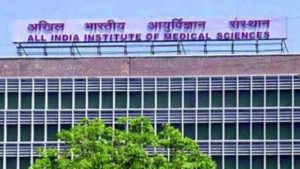 Close on the heels of the “Do Not Resuscitate” (DNR) guidelines created by the Indian Council of Medical Research (ICMR) comes this welcome news. All India Institute of Medical Sciences (AIIMS), New Delhi has created draft guidelines for end of life care.
Close on the heels of the “Do Not Resuscitate” (DNR) guidelines created by the Indian Council of Medical Research (ICMR) comes this welcome news. All India Institute of Medical Sciences (AIIMS), New Delhi has created draft guidelines for end of life care.
We shall eagerly await the final document when it goes up on AIIMS website for public suggestions.
Read: AIIMS’ draft end-of-life policy gives terminally-ill patients, family, option to end treatment
–
On Need for Access to Morphine
Dr Namruta, a pain management specialist from Rishikesh who visited Pallium India in January 2020, writes:
Until I worked as a resident in interventional pain medicine, the idea of pain management to me was simply perioperative pain relief. I had no idea that chronic pain is in itself a disabling disease that encompasses physical, emotional, psychological ill effects as well as financial burden.
The following is just one of the many stories of patients/caregivers in smaller cities.
“I am a caregiver who has seen the suffering that cancer brings and the devastation that it brings with it.
“My mother was 70yrs old when she was diagnosed with late stage pancreatic cancer, last June. It all began with severe stomach pain, such that even her routine activities were affected, making her feel incapacitated. As the cancer had progressed to an extent where any definitive treatment was futile, she was advised injection in her back to relieve the pain and improve the quality of life. The injection was helpful and I was relieved to see the relief it provided her, but it lasted only for a month as the cancer still progressed.
“When the pain returned, it came back with a vengeance, making her cry in agony. She was admitted and given care to help with her pain. As the pain drugs started working, she was discharged with pain medication – morphine tablets to take home for pain relief.
“The tablets have been of immense help, they have helped her to maintain a normal routine making her able enough to move around and also to eat. However, the cancer was still progressing and she started feeling weak as it advanced. She became bedridden and expressed her wish to go to her hometown.”
Read the complete article: https://palliumindia.live-website.com/2020/02/on-need-for-access-to-morphine/
–
IAPCON 2020 – An experience behind the scenes
Rontu Sangma, Pallium India’s Regional Co-ordinator- North East India, writes:
The 27th International Conference of Indian Association of Palliative Care (IAPCON 2020) was held at my hometown of Guwahati from February 14th to 16th. The Conference was organised at Guwahati Medical College under the leadership of Dr Dinesh Goswami and Dr Arun Deka as organizing chairperson and organizing secretary respectively. This was the second time in the history of IAPCON that North-East India was chosen to host the event.
The North East is known for its hospitality, cultural and gastronomic richness and biodiversity. Though remote and hard to reach as compared to mainland India, healthcare in the region is gradually improving thanks to new hospitals and medical colleges. However, access to pain relief and quality palliative care remains a huge challenge. As the regional co-ordinator of Pallium India’s national outreach program in the North East, I work with government, policy makers, public and private healthcare providers, civil society and most importantly patients and their care givers to promote palliative care in the region.
I have been preparing for the conference since August 2019 as I saw it as an opportunity to bring together and galvanize the palliative care fraternity in the region as well as to follow up Pallium India’s past work in the region. I met Dr. Arun Deka (HoD, Dept. of Pain & Palliative Care, SCI) at HM Hospital, Guwahati in August 2019. He was warm and receptive and later on his demand, he along with his team was introduced to Pallium India team at Trivandrum. Subsequently I met Dr. Kabindra Bhagabati (Medical Officer PCU) of Dr. B. Borooah Cancer Institute, Guwahati, as I went to attend their ‘Nursing Workshop in Palliative Care’. In that workshop, I also got the opportunity to meet Dr.Dinesh Goswami, CEO of Guwahati Pain & Palliative Care Society and organizing chairperson of IAPCON 2020. This meeting was a breakthrough in my advocacy and outreach work in the region as I was able to build a strong professional bond with leading stakeholders in the region and was henceforth invited to become part of future workshops and meetings in the region. Later on, I was invited to be part of the IAPCON organizing committee.
Read the rest of the article: https://palliumindia.live-website.com/2020/02/iapcon-2020-an-experience-behind-the-scenes/
–
DISHA- To find the right path
The Kerala Chapter of PMI (Project Management Institute) is guiding Pallium India’s alumni students (who were once receiving Pallium India’s education support) to make them more competitive and employable, and help them discover more opportunities in their relevant fields.
The first career guidance workshop by PMI was conducted in October 2019.
The second workshop of PMI was conducted at Pallium India on 23rd February 2020. This time we could bring in more number of our alumni students, and it was attended by 13 of them along with PMI volunteers, Pallium India volunteers and staff.
The forenoon session was taken by PMI volunteers – Mr. Sreejesh Varrier, Mr. Krishnakumar, Mr. Harikuttan, Mr. Jayakishore, Mr. Prageeth, Mr. Vyshak and Ms. Nimmy.
Mr. Sreejesh Varrier and Mr. Jayakishore gave a talk on how communications could be made effective and how well we can introduce ourselves. This was followed by a round of self-introduction by the students which was well co-ordinated by Mr. Prageeth, Mr. Vyshak and Ms. Nimmy. The students also spoke about a particular topic given to them which was recorded and shown back to them. PMI Members guided the students on how better the self-introduction could be made and added on relevant concerns after each talk.
The afternoon session was on “Skills for future” by Dr. Jaikiran from ASAP, Department of Higher Education, Government of Kerala. The session included a group activity on promoting an innovative idea in which all the students have taken active part. Later, Dr. Jaikiran explained about the 10 core life skills laid down by WHO and about the success formula for future.
The students found the sessions informative as well as fun. They especially found their own videos of self-introduction interesting and were able to learn from each. Hoping to have such educational and recreational sessions in future from PMI.
–
Donate to Pallium India
 The money you give will pay for essential free medicines for the poor, for their travel to the clinic or for schooling of their children, or other forms of care.
The money you give will pay for essential free medicines for the poor, for their travel to the clinic or for schooling of their children, or other forms of care.
Please give whatever you can. No amount is too small.
To donate, please visit:
https://palliumindia.org/donate/ (India)
http://palliumindiausa.org/ (USA)
Write to us: info@palliumindia.live-website.com
Call us: +91-9746745497 (India) / +1-718-273-8597 (USA)
All donations to Pallium India are tax deductible.
–
Upcoming Events
- Mar 2, 2020: Certificate Course in Pain and Palliative Medicine (for doctors) and Certificate Course in Palliative Nursing (for nurses) at Trivandrum. CCPPM: https://palliumindia.live-website.com/courses/ccppm/ CCPN: https://palliumindia.live-website.com/courses/ccpn/ Contact: +91 8589998760 / education@palliumindia.live-website.com
- Mar 2, 2020: Advanced Certificate Course in Pediatric Palliative Care at MNJ Institute of Oncology, Hyderabad. Contact: mnj.palliative@gmail.com
- May 4, 2020: 10 day Foundation course for doctors (FCPPM) at Trivandrum. Contact: +91 8589998760 / education@palliumindia.live-website.com
- Jun 1, 2020: Certificate Course in Pain and Palliative Medicine (for doctors) and Certificate Course in Palliative Nursing (for nurses) at Trivandrum. CCPPM: https://palliumindia.live-website.com/courses/ccppm/ CCPN: https://palliumindia.live-website.com/courses/ccpn/ Contact: +91 8589998760 / education@palliumindia.live-website.com
- Jul 1, 2020: Clinical Fellowship in Pediatric Palliative Medicine at MNJ Institute of Oncology, Hyderabad. Contact: mnj.palliative@gmail.com
Have Queries? Write to: info@palliumindia.live-website.com.
Find out more about our courses at: https://palliumindia.org/courses/
–
Vacancies
Medical Social Worker at Trivandrum
Organization: Pallium India
Job Title: Medical Social Worker
Nature of Job: Permanent – Full Time
Vacancy: 2 (two)
Remuneration: Depends on candidates’ Knowledge, Skills and Attributes
Reporting to: Additional Director – TIPS
Place of Job: Trivandrum
Qualification: Masters in Social Work (Full-Time) from a recognized university with specialization in Medical & Psychiatry
Experience: Fresher /1-2 years
Click here to know more and to apply: https://palliumindia.live-website.com/2020/02/vacancy-medical-social-worker-at-trivandrum/
Project Co-ordinator for ECHO at Trivandrum
Organization: Pallium India
Job Title: Project Co-ordinator for ECHO
Nature of Job: Permanent – Full Time
Vacancy: 1 (one)
Reporting to: Director – Programme
Place of Job: Trivandrum
Qualification: Graduate in any field
Click here to know more and to apply: https://palliumindia.live-website.com/2020/02/vacancy-project-coordinator-echo/
Staff Nurse at Pallium India, Trivandrum
Organization: Pallium India
Job Title: Staff Nurse
Nature of Job: Contract – Full Time
Remuneration: Depends on candidates’ Knowledge, Skills and Attributes
Reporting to: Nurse-In-Charge
Place of Job: Trivandrum.
Qualification: B.Sc Nursing/GNM graduate from a recognized university with Kerala Nursing Council Registration
Desired Qualification: Certification in Palliative Nursing
Experience: Fresher /1-2 years
Click here to know more and to apply: https://palliumindia.live-website.com/2020/02/vacancy-staff-nurse-at-pallium-india-trivandrum/
–
Pallium – a poem by Tom McNalley
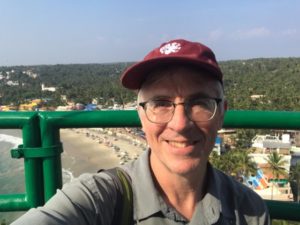 On the hard cots of Kerala, in the homes
On the hard cots of Kerala, in the homes
of the impoverished and the prosperous,
close by the rubber trees weeping
from the black angled lacerations
their tears falling into coconut husks,
the suffering and the dying lie expectant.
We press multiply into singular spaces, accept seats in chairs,
the wives or the sons, husbands or daughters bring us
the blister packs, the folded kraft-paper bags,
marked 1-0-1, 1-1-1-, 0-0-1 for the thrice-divided day.
Under the stoic gazes of the ancestors,
they tell us the stories their bodies have told them.
We attend with mind, heart to the songs of suffering,
nod, sway inside ourselves, rhythmic
to the shared song of impermanence.
The suffering and dying smile and reach out their hands,
we are for the moment all less alone,
we share the dance of last life before death.
Tom McNalley is a physiatrist and palliative care doctor currently completing his fellowship in pediatric palliative care at the University of California, San Francisco. He writes poetry and has published them in online journals. He visited Pallium India for the first time in February of 2020.
–
Sign of Nest
A group of thirteen young people got together at the time of the floods in Kerala of 2019 to do what they could to help. And they rendered phenomenal service.
Perhaps, then they realized their own power to make changes in other people’s lives. The group continues as ‘Sign of Nest’ and looks for and looks around to see who needs help the most.
They found that people with some disabilities are unable to write for themselves at examinations and needs scribes. The regulations would have several restrictions, like the scribe has to be younger than the examinee. And often it is not easy to find a scribe who offers help and is available when needed. These youngsters are offering themselves as scribes and are running a campaign for recruiting more young people as scribes.
During an event in Trivandrum on 20th of February 2020, the “Sign of Nest” honored Pallium India’s Ashla Rani along with Krishnakumar P, Rajaneesh S.S and Chandrikamma S. The plaque given to Ashla says “we offer a thousand roses of love and respect to Ashla Rani M.P who proves to the society that physical disability is not a barrier to performing good deeds for the needy.”
Proud of you, Ashla. Respects to you, members of Sign of Nest.
–
Kerala model palliative care: an article
Reeya Rao and Sagarika Pradhan, two students from Delhi travelled to Kerala to study the community-based palliative care model. They went to General Hospital, Ernakulam where, within a government setup, Dr. Mathews Numpeli developed an admirable palliative care service within the government hospital, well integrated into the institution’s healthcare delivery. Dr. Athul Joseph Manuel is leading the program now.
Reeya and Sagarika write about what they saw in Ernakulam and in the rest of the state. Unlike many others, this article on palliative care in Kerala has depth. Please give it a read:
Kerala Shows How Palliative Care Can Be Safely Administered
–
An enriching experience
Mr Pranab Kumar Basu, a volunteer for Eastern India Palliative Care (EIPC), visited Pallium India for two days in January 2020. He shares his experience:
My two-day visit to Pallium India has touched me profoundly and enriched my mind. On Day 1 (24 January), Project Co-ordinator Rajalekshmi Balu introduced me to the members of the sweet family of Pallium India, and I was enthralled by their hospitality. I was honoured to be a part of the weekly team meeting for review of the works done in different spheres by the volunteers, medical social workers, nurses, social workers, doctors, and co-ordinators. I was asked to introduce myself. I told the team that I am a volunteer who counsels terminal cancer patients and families registered at Eastern India Palliative Care (EIPC), Barrackpore, WB.
Afterwards, I met medical social workers, volunteers, National Outreach Team, project officer, nursing in charge, and, through sharing, I learned a lot. I had a discussion with Dr Chandrika Rajagopal and Dr Sunil Kumar regarding the protocol of morphine advised to terminal cancer patients. In noble social work there is no value for “I”. Instead, “We” plays a vital role. Pallium India demonstrates the message that “Together we can make a change”.
Read the rest of the article: https://palliumindia.live-website.com/2020/02/an-enriching-experience/
(Image: Mr Pranab Basu, right, with Mr Nandu and Mr K N Nair of Pallium India)
–
Join Us on Social Media
Pallium India’s Facebook page has over 9500 likes. We regularly post articles related to palliative care from around the world. Click here to Like our page!
Follow us on Twitter: @palliumindia and Instagram: @palliumindia
–
 Palliative Care Information Centre
Palliative Care Information Centre
Contact Pallium India’s Information Centre (9 am to 5 p.m., except on Sundays and National holidays) for information related to palliative care and about establishments where such facilities are available in India.
Telephone: +91-9746745497
or E-mail: info@palliumindia.org
–
PARTING SHOT
Think you want to die at home? You might want to think twice about that
See this series of illustrations in Los Angeles Times by Nathan Gray, an assistant professor of medicine and palliative care at Duke University School of Medicine and an artist who draws comics on medical topics.
—

